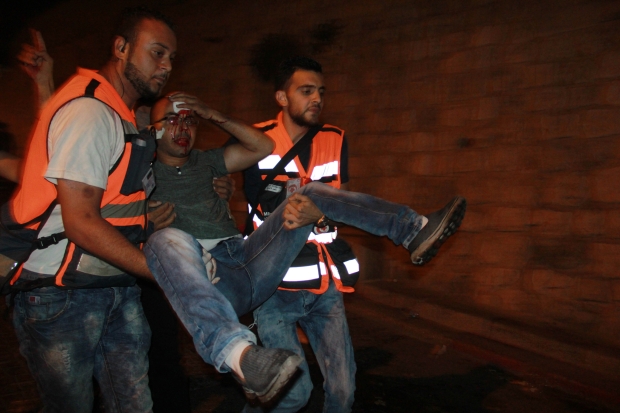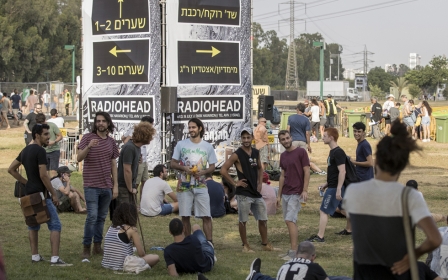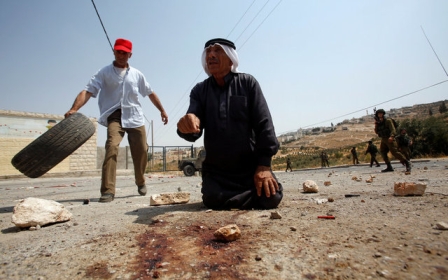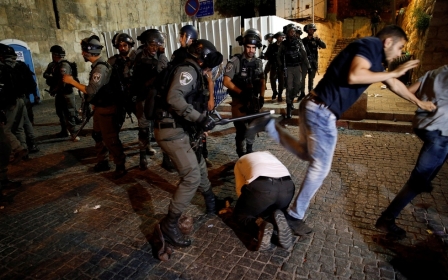Israeli forces wound 22 Palestinians in Jerusalem's Old City

Israeli forces wounded 22 Palestinians at Lion's Gate near Haram al-Sharif in Jerusalem on Thursday night.
According to the Red Crescent, two of those hurt are in serious condition after they were hit by a stun grenade.
There have been nightly confrontations between Palestinians hurling stones and Israeli police using stun grenades in Israeli-occupied East Jerusalem since Sunday, when metal detectors were placed at entrances to the Noble Sanctuary compound.
Israel's Prime Minister Benjamin Netanyahu considered removing the devices at the Jerusalem holy site after a deadly attack last week that stirred up Palestinian protests and threats of escalation. But so far, the detectors remain in place.
Muslim religious authorities say the metal detectors violate a delicate agreement on worship and security arrangements at the Jerusalem site and have urged Palestinians not to pass through. Prayers have been held near an entrance to the complex.
Tensions were high ahead of Friday prayers, when thousands of Muslims usually flock to al-Aqsa mosque, Islam's third-holiest shrine, in the Noble Sanctuary compound.
Israeli police said on Friday they were barring men under 50 from entering Jerusalem's Old City for Friday Muslim prayers.
"Entry to the Old City and Temple Mount will be limited to men aged 50 and over. Women of all ages will be permitted," a police statement said.
Palestinian factions vowed it would be a "day of rage", and Israel put five army regiments on standby to reinforce troops in the occupied West Bank.
Netanyahu held security consultations over the issue on his return to Israel from visits to France and Hungary. Israeli Public Security Minister Gilad Erdan said Netanyahu was expected to decide on a course of action during the evening meeting.
Far-right members of Netanyahu's government have publicly urged him to keep the devices in place at the flashpoint site. Still, Israeli media reports said security chiefs were divided over the issue amid concerns about wider Palestinian unrest in East Jerusalem and the West Bank.
"The prime minister is considering whether to change this decision, and that's his prerogative," Erdan said on Army Radio. He described the equipment as a legitimate security measure.
On 14 July, three Palestinian citizens of Israel shot dead two Israeli policemen outside the Noble Sanctuary complex in one of the most serious attacks in the area in years. The assailants were killed by Israeli forces.
Ismail Haniyeh, leader of the Hamas Islamist movement that rules Gaza, called on Palestinian demonstrators to confront Israeli troops along the enclave's border on Friday.
"Let Friday be a turning point in the battle in the defence of Jerusalem and al-Aqsa," Haniyeh said in a televised speech.
Nickolay Mladenov, the United Nations special coordinator for the long-stalled Israeli-Palestinian peace talks, called for calm.
Turkish President Recep Tayyip Erdogan, after discussing the stand-off with Palestinian President Mahmoud Abbas, spoke to Israeli President Reuven Rivlin by phone to urge an end to the metal detector searches, sources in Erdogan's office said.
Rivlin's office said he had defended the security measures and assured Erdogan that freedom of worship would be maintained.
Israeli forces occupied East Jerusalem, along with the West Bank, in the 1967 Middle East war. Palestinians want a state in the West Bank and Gaza Strip with East Jerusalem as its capital.
Israel considers all of Jerusalem its capital, a claim that is not recognised internationally.
New MEE newsletter: Jerusalem Dispatch
Sign up to get the latest insights and analysis on Israel-Palestine, alongside Turkey Unpacked and other MEE newsletters
Middle East Eye delivers independent and unrivalled coverage and analysis of the Middle East, North Africa and beyond. To learn more about republishing this content and the associated fees, please fill out this form. More about MEE can be found here.





